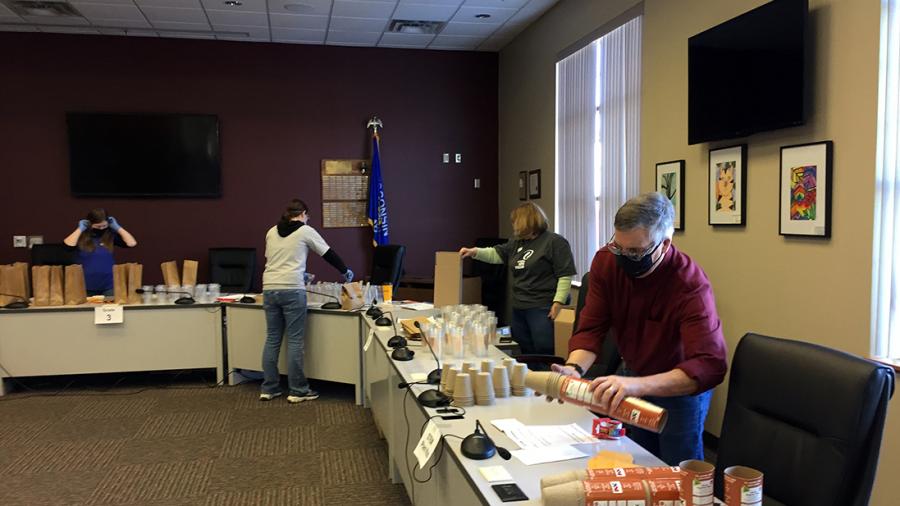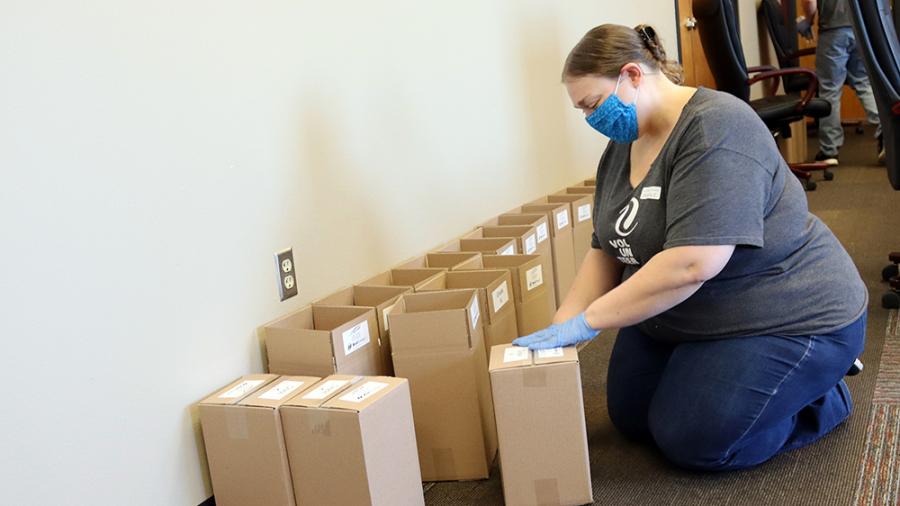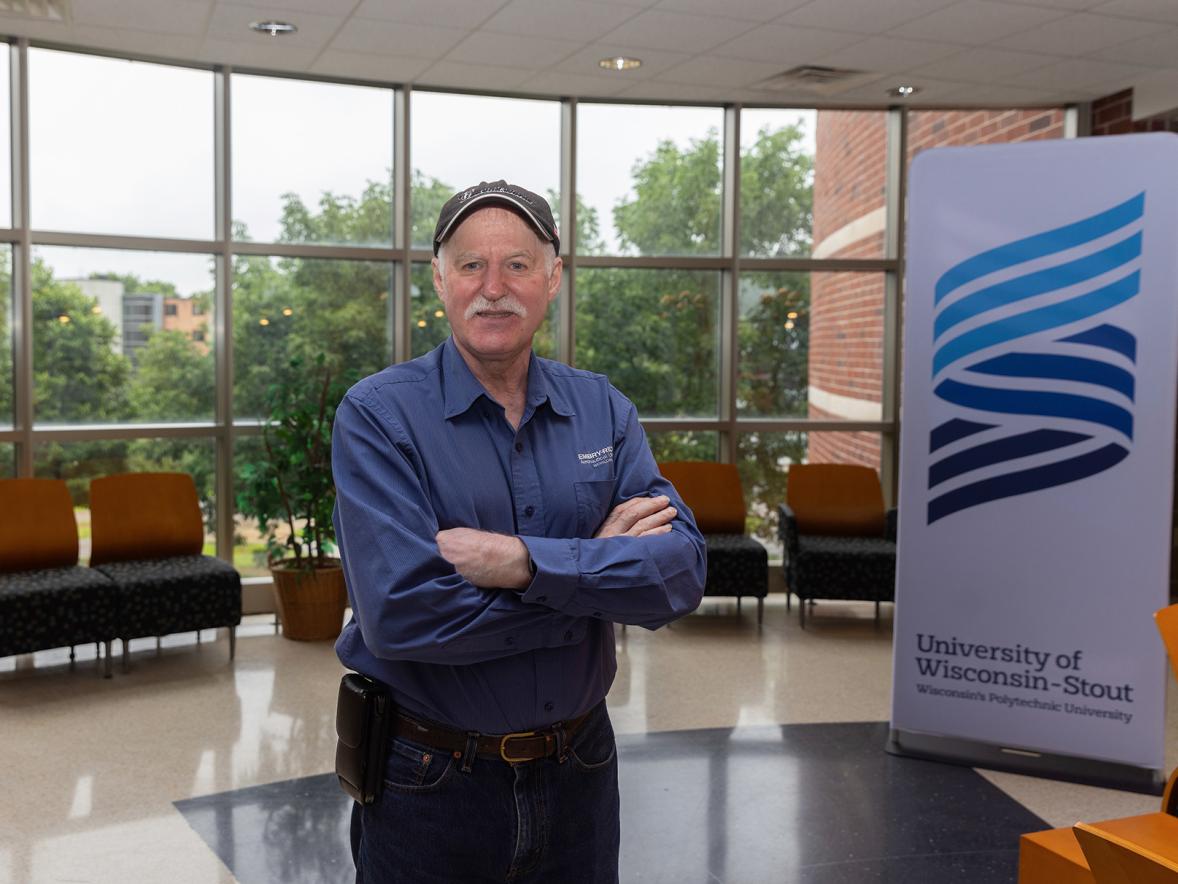University of Wisconsin-Stout biology lecturer Tiffany Hoage collaborated with local teachers to design educational plant and genetics kits.
Terry Staupe, a Menomonie school district library media specialist who is teaching second grade virtually this school year, said the kits will allow students to do hands-on experiments. “This is something they can do and observe,” Staupe said. “They are reading, writing their observations, learning about science, drawing out plants and creating a poster of the data they have collected.”
The kits are designed for different grade levels with different learning objectives, Staupe said.

Kindergarten and first-graders will observe the seeds germinating, second-graders will learn about the variables that impact plants including sunlight and partial light, third-graders will put plants at different angles to learn how they respond to gravity, fourth-graders will build a greenhouse and see its impact on plants, and fifth-graders will learn about plant biomass and energy.
Eight volunteers from Xcel Energy in Eau Claire on March 18 gathered at the Menomonie school district administrative building to assemble 150 single-use plant kits containing soil, pots and bean seeds for home-based students. The kits, funded through the Xcel Energy Foundation, are headed to classrooms this week.
During the kit building, Pam Taylor, of Eau Claire, an Xcel Energy transmission engineer and data analyst, poured potting soil into small brown paper bags.
“I always like volunteering in the community, getting out and doing good,” Taylor said.
I think the plant kits will be good learning tools for students. It’s always fun to see how plants grow.”
Michelle Ellis, of Eau Claire, who is part of the Xcel Energy customer correspondence office, counted out bean seeds and placed them in small envelopes for the kits. “I love giving back to the kids,” Ellis said. “This is something I can do to help out. I love volunteering.”

Jon Gean, of Eau Claire, also from customer correspondence , said he was excited to be part of the project to help students learn. “I think it’s pretty cool. I never had a chance as a kid to grow anything. Learning about agriculture is pretty interesting.”
Hoage also assembled eight reusable STEM plant kits and a genetics kit. The STEM plant kits contain an LED growing station and digital scale for elementary students to design and conduct experiments of interest. The genetics kit includes equipment for eight groups of students to make copies of DNA, separate the DNA based on size and visualize it.
The kit also allows students to learn hands-on about CRISPR/Cas9 technology, which is relatively new and being used in clinical trials to treat human diseases. Menomonie, Colfax and Boyceville schools will be using the kits this spring semester.
Hoage has made how-to videos for the kits as well.
“Combining the expertise of UW-Stout faculty and staff with the expertise of K-12 teachers results in great opportunities for K-12 students,” Hoage said. “I enjoyed working with the teachers and thinking about what great learning opportunities these kits will provide students. Having reusable kits that can be checked out by local school districts provides opportunities that students might not otherwise have.
“Genetics equipment is quite expensive, especially for several groups of students. School districts can save money by sharing the reusable kits, and the learning experience can be more valuable for students who work in smaller groups. I am so thankful for the generous funding provided by the Xcel Energy Foundation to make such opportunities possible,” Hoage added.
If teachers or school districts are interested in implementing the reusable STEM plant kits or genetics kits, contact Gindy Neidermyer, interim dean of the College of Science, Technology, Engineering and Mathematics. Educators with future ideas for kits should also contact Neidermyer at 715-232-4053.

Earlier this year, the Xcel Energy Foundation also funded the STEAM Powered Girls event for 33 Girl Scouts who virtually investigated plastics, made comics and learned about fingers, lungs and urine formation. Xcel also supported five campers to attend this past summer’s STEAM Experience.
The Summer STEAM Experience will be offering classes in science, technology, engineering art and design Monday, June 14, to Thursday, June 17.
The camp will run online with the potential to transition to in person per University of Wisconsin and Dunn County Public Health regulations. Students entering grades nine to 12 are invited to explore career paths with UW-Stout faculty experts.
Camp activities and a college student panel will provide well-rounded experiences to highlight the possibilities of creative and critical thinking. Tracks will include human anatomy, 2D animation, video game design, interior design, tabletop game design and music and math. UW-Stout offers undergraduate degrees in the biology department including applied biochemistry and molecular biology, environmental science and professional science master’s degree in conservation biology.
The university offers a biology concentration in the B.S. applied science degree. Other concentrations offered include applied physics, industrial chemistry, interdisciplinary science and materials and nanoscience.






